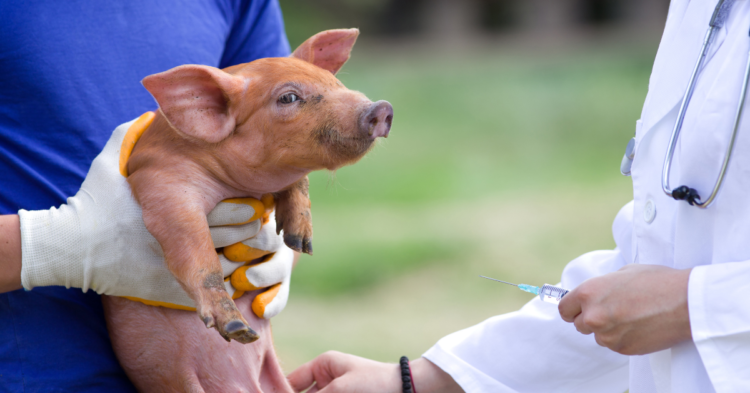Health in the News: Improvest Vaccine
This is old news but revisited from a recent interview with Joel Salatin of Polyface Farms (https://www.polyfacefarms.com/ ). Apparently the FDA approved use of a vaccine called Improvest in 2011 in the swine industry. As an “incomplete version of a growth regulator vaccine” Improvest is a 2ml, 2-dose vaccine which temporarily suppresses testicular function prior to slaughter by blocking the pig’s growth hormone released via the hypothalamic-pituitary-gonadal endocrine axis.
Improvest, also called Improvac in other countries, has now been used in 60 other countries and has been in use for over 10 years in the United States. The purpose of the vaccine is to decrease the boarish flavor of androstenone and skatole (a foul-smelling crystalline compound) in the meat of uncastrated mature male hogs. These flavors apparently present themselves in the meat starting at 4-6 months of age.
Early castration of the piglets prevents this flavoring taint in the meat, but then the pigs don’t grow as quickly, don’t retain as much water in the muscle tissue and the hog farmer makes more money overall by using the vaccine. Additionally, in nature the sow weans her young around 13 weeks of age, but in confinement the piglets are weaned at 10 days of age. The extra stress of early weaning also diminishes grow rates but done because the sow can be rebred sooner. What a factory mentality, eh?
When I lived on a swine farm for two years in my pre-veterinary days, we castrated all the male piglets on day 3-7 of age. This didn’t take long, the piglets seemed to get over the pain of the procedure by the next day (mostly I think they just didn’t want to be restrained for the procedure although the castration must have hurt like heck) and in all my time there, I didn’t see any infection from this procedure and no piglet deaths from castration.
The meat produced from Improvest vaccinated pigs is supposedly safe for humans to eat BUT the vaccine is contraindicated in intact male pigs intended for breeding as it “disrupts reproductive function”. In addition, pregnant women should never administer the vaccine and women of child bearing age should be extra cautious says the vaccine insert given out by the company. If accidentally stabbed by the vaccine needle you would never be able to give same vaccine ever again (or any vaccine like it).
Gee, this doesn’t sound so safe to me.
Now I’m sure some of you are asking who would be so stupid to accidentally vaccinate themselves. Let me tell you as a veterinarian-–things happen. The Bangs vaccine is another one of those tricky vaccines you don’t want to accidentally inject yourself with but it happens too. As for myself, I doubt I’ll ever get parvo or feline leukemia in my lifetime. Ouch! Lucky it wasn’t a full dose I guess.
Animal safety studies included only 30 animals which were divided into three groups—so 20 animals actually got two different strengths of vaccine and ten were controls. Side effects therefore were only evaluated in 20 animals. Seems a bit low doesn’t it?–Especially when millions of pigs are grown for food every year.
On the other hand, a study using 767 consumers sensitive to tainted meat flavor was done to determine which meat they felt had better taste—the vaccine treated pork or uncastrated pig meat on the basis of aroma and flavor. Pork from castrated males were not included in the taste comparison.
I can understand why you wouldn’t want to eat ‘gamey’ meat, but at the time of slaughter these pigs are only 5-6 months old. It’s not like you’re eating five year old boar meat. That meat would be so tough it would probably end up somewhere else. Right? Michael Pollan’s article (link below) states that over 75% of all pork is processed to make other pork type of products. I’d like to know what kinds of tests were done to determine the statement from the company, “There are no residues in the meat from Improvest-managed pigs that could affect human health.”
The Improvest vaccine is conjugated with diphtheria toxoid. It has been said diphtheria vaccine has been “determined as safe since the 1930s” but what makes it safe when the consumer is eating pork many times a month? We only get vaccinated for diphtheria how many times in our life? Wouldn’t it make sense that constant exposure to something we are rarely exposed to could disrupt something in our bodies?
If they now label milk as growth hormone free, why can’t they label pork as Improvest free? Why can’t we know what is in our food?
As a side note, the veterinary profession has been working on chemical castration for years also thinking that it would be much less invasive to give a dog or feral cat a shot to sterilize it than to perform the more invasive surgical procedures. Of course in companion animal medicine we wouldn’t really know by looking at a pet if they were sterile or not if there was a vaccine that would do this. The testicles in most cases would still be visible. Much discussion over the years has been centered around implanting fake testicles so that the animals would still feel macho (or maybe the owner would feel better about seeing a set of testicles and not feel badly for having them neutered). Anyway, it’s still a hot topic of discussion in our field.
Farmers wishing to use the Improvest vaccine must go through a stringent training program viewing web based training, learning how to use the special equipment and biosecurity protocols. They are taught “professional behavior” (I wonder what this means), worker safety and they are taught how to use the Improvest Platform with Global VetLink. All information is uploaded through a Smartphone and this program is linked to a GPS to track pig location and movement for every pig vaccinated.
Gee, this sounds kind of like what they are doing with the Gardasil (human) vaccine as well. Sort of George Orwell 1984, don’t you think?
Well I don’t know about you all, but I’d rather know that the meat that I do eat is fed food that it would normally eat out in the wild (not soy), forage that has not been sprayed with anything (Roundup), that the animal was not pushed with some kind of vaccine to gain weight with and that the meat was safe to eat in that it not contain antibiotics or arsenic or some kind of chemical that would disrupt my endocrine system. I’m all for the Just Label It idea. Other countries do this. Why can’t we?
Helpful Links and References for Improvest Vaccines:
- An Animal’s Place by Michael Pollan https://michaelpollan.com/articles-archive/an-animals-place/
- Just Label It campaign: https://www.justlabelit.org/
- Improvest vaccines: https://www.zoetisus.com/products/pages/improvest_new/index.html

